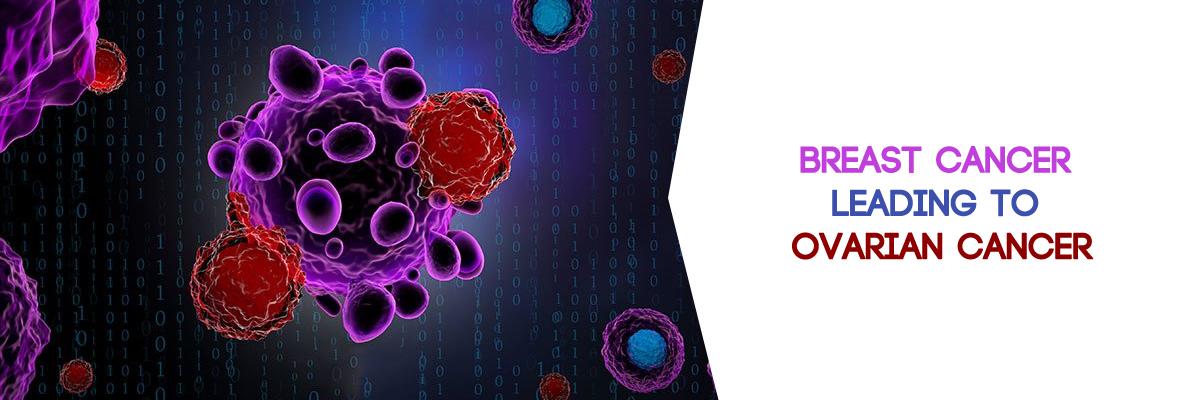Live
- Nizamabad MP Dharmapuri Arvind and Jagtial MLA Dr. Sanjay Kumar Meet CM Revanth Reddy
- Hyderabad CP CV Anand Issues Stern Warning to Bouncers
- MP Laxman Criticizes Police Conduct, Calls for Support for Victims' Families
- Fire Breaks Out in Kachiguda-Chennai Egmore Express, Passengers Evacuated Safely
- CM Revanth Reddy Condemns Attacks on Film Personalities' Homes, Calls for Strict Action
- Victory Venkatesh and Nandamuri Balakrishna to Set Screens on Fire with Unstoppable Season 4
- Over 71.81 crore Ayushman Bharat Health Account numbers generated: Centre
- In special gesture, Kuwait's Prime Minister sees-off PM Modi at airport after conclusion of historic visit
- Veer crowned PGTI Ranking champion, Shaurya wins emerging player honour
- Sr National Badminton: Unseeded Rounak Chauhan, Adarshini Shri reach singles semis
Just In

Breast cancer, the leading cause of mortality among women in India, is being seen as an augmenting factor in the rise in ovarian cancer cases as well, according to medical experts
New Delhi, Dec 22: Breast cancer, the leading cause of mortality among women in India, is being seen as an augmenting factor in the rise in ovarian cancer cases as well, according to medical experts.
Dr M.D. Ray, surgical oncologist at AIIMS, Delhi, says women who have been diagnosed with breast cancer remain at a higher risk of contracting ovarian cancer due to the presence of same gene that triggers both cancers.
"Genes are responsible for cancer. Owing to the rise in the incidence of breast cancer, we have observed that there is a considerable increase in cases of ovarian cancer as well in the past few years. Even at AIIMS there have been many cases where a female patient has been diagnosed with both," Dr Ray told IANS.
BRCA1 and BRCA2 are human genes that produce tumour suppressor proteins. However, when either of these genes is mutated -- meaning it doesn't function correctly -- the damage to the DNA may not be repaired properly. As a result, cells are more likely to develop additional genetic alterations that can lead to cancer.
"There are two types of genes -- BRCA1 and BRCA2 -- which are responsible for both breast and ovarian cancer. Dysfunction of these two genes increases the chances of getting diagnosed with both the cancers. An individual with breast cancer, therefore, remains at risk of facing ovarian cancer and vice versa," Dr Ray noted.
"If one has breast cancer, there are 30-35 per cent chances of also having ovarian cancer. And if the person has ovarian cancer, there are 10-15 per cent chances of getting diagnosed with breast cancer," Dr Mala Srivastava, oncologist, Sir Ganga Ram Hospital, noted.
Specific inherited mutations in BRCA1 and BRCA2 most notably increase the risk of breast and ovarian cancer, but they have also been associated with increased risks of several additional types of the disease like fallopian tube cancer, peritoneal cancer, colorectal cancer and pancreatic cancer.
Women who have inherited mutations in BRCA1 and BRCA2 tend to develop breast and ovarian cancers at younger ages than those without these mutations.
Although presumed to be more common among women above 50, Dr Ray noted that both breast and ovarian cancer cases are increasing among women below 35 as well.
"This is owing to poor lifestyle habits. And this is not confined to any particular economic class. A sedentary lifestyle further escalates it," he added.
Since both cancers are related to genetics, medical experts suggested that women should start screening and gene-testing at an early age.
"For, say, if one or two family members had breast or ovarian cancer then all the women in that family should be tested for BRCA 1 and BRCA 2. Secondly, the screening for both breast and ovarian cancer should start early in life. Suppose a woman's mother had breast cancer at the age of 45, then she should start mammography at the age of 35," Dr Srivastava pointed out.
In India, however, gene tests are still costly which is why many women fail to get diagnosed in time. Dr Srivastava said that a gene test would cost around Rs 25,000 to Rs 26,000.
"In India, almost 90 per cent patients come to a doctor when in an advanced stage because they don't get detected at an early stage. The main reason is that the symptoms of ovarian cancers are very vague. Despite all types of high-tech surgeries, the survival rate is less than 30 per cent," Dr Ray added.
The doctors claimed that if detected early, both cancers are curable.
"Now-a-days, treatment is very good. If a woman diagnosed with breast cancer is detected and treated at an early stage, there are less chances of her having ovarian cancer," Dr Srivastava explained.
According to a latest ICMR-Lancet report, breast cancer is the leading cancer among Indian women. States like Kerala, Punjab, Tamil Nadu, Delhi, Maharashtra, Karnataka, and Haryana were found to have the majority of cases.
The report also stated that ovarian cancer has the sixth-highest incidence rate with the majority in states like Kerala, Delhi, Arunachal Pradesh and Punjab.

© 2024 Hyderabad Media House Limited/The Hans India. All rights reserved. Powered by hocalwire.com







